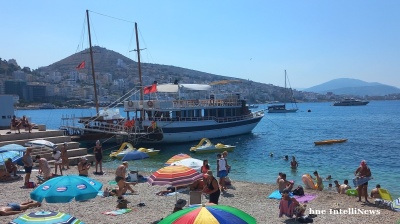Albania’s Socialist-led government received just rewards for its reform efforts on November 9 when the European Commission recommended the launch of accession negotiations, saying it has made steady progress on the priorities set since becoming an EU candidate country in 2014, chiefly those centred on the rule of law. While Tirana appears committed to pressing on with the reforms, political resistance, especially surrounding the critical area of judicial reform, is high and is set to grow as next year’s parliamentary elections approach.
After months of discussions, a brief consensus was reached between the ruling Socialist Party and its bitter rivals the Democratic Party allowing constitutional amendments that would pave the way for judicial reform to be unanimously approved by the parliament in July.
However, this brief rapprochement didn’t last long. Albania’s next step is to pass the package of seven key laws on judicial reform, but this has already become bogged down in political infighting, as noted by European Commissioner Johannes Hahn when he presented the Commission’s latest enlargement progress reports on November 9. “Pivotal constitutional amendments were unanimously adopted in July 2016, launching a thorough and comprehensive judicial reform process system,” Hahn commented. He added, however, that “credible and tangible progress” should be made in the implementation of the reforms, in particular on the vetting law.
This law, arguably the most important part of the reform, was approved by the parliament without the support of the Democratic Party, but was suspended in October and sent to the Constitutional Court for evaluation. One of the objections raised by the opposition is the introduction of international experts to the selection process for judges, in a move to end political appointments.
The vetting law is critical to cleaning up the judicial system and the prosecution, both of which have been staffed by political appointees for the last 25 years. It will involve checking the assets and qualifications of all incumbent judges in Albania, as well as those of potential appointees. This has caused a wave of panic within the judiciary, where many judges have become extremely rich off the back of bribes and other illegal payments, and are now rushing to hide their assets before the system comes into effect. “All the data show the justice system is not only deeply politicised, but corrupt to the teeth,” says Arolda Elbasani of the Robert Schuman Centre for Advanced Studies.
While the opposition claims using international experts will result in a loss of sovereignty for Albania, Elbasani points out that, “knowing how corrupt the judiciary is… how can a system clean itself? It needs externals who have no stakes in the system.”
Gledis Gjipali, executive director of the European Movement in Albania, agrees that the central plank of judicial reform is the vetting law. “The biggest problem is that the system is already heavily corrupt and for years this has been unbreakable,” he says. So far, according to Gjipali, no judges or prosecutors have been dismissed or prosecuted for corruption-related crimes. Now the government is attempting to clean up the system, “there is a resistance and this has been delaying the reforms”.
Further delays are anticipated in the run-up to the June 2017 elections. The Democratic Party has, for example, called for the implementation of the decriminalisation law to be conditional on Albania getting the go-ahead for negotiations. While the decriminalisation law is laudable in theory, the form in which it has been adopted is virtually unworkable, meaning this is seen as a further delaying tactic. “European integration is such a consensual agenda for Albania… we now see how resistance to reform is much more important than advancing the country towards integration,” comments Elbasani.
However, she believes there is one positive thing to have come out of the open political wrangling over the reform process: “As Byzantine as the whole process is, at least we now see clearly who stands for what.”
Fighting organised crime
Judicial reform is not only important for its own sake, but also because it will be difficult to make concrete progress on tackling organised crime and corruption without an effective and impartial justice system to bring criminals to account.
The latest European Commission enlargement report on Albania noted the country’s achievements in the fight against corruption, but said more needed to be done to tackle high-level graft. “Corruption remains prevalent in many areas and continues to be a serious problem,” it said.
Albania launched a dramatic attack on the country’s “marijuana mountain” at Lazarat, where a staggering 900 tonnes of the drug used to be produced each year. The operation took place immediately before a European Council decision on Albania’s EU candidate status in June 2014. However, since then there have been reports that drug cultivation is continuing.
Gjipali argues that steady work is needed in the area of fighting organised crime. “This is an issue that cannot be resolved in the short term, with ad hoc successes against trafficking or narcotics, it needs continuous work and better integration of all the systems,” he says. “Without the justice system working properly… it’s very difficult to see long-lasting results, especially against organised crime.”
Crime and corruption aren’t the only areas Albania has to address. While the country’s economy is growing rapidly – the European Commission forecast 3.2% growth in 2016, accelerating to 3.5% in 2017 and 2018 in its Autumn Forecast on November 9 – it still lags well behind even the EU’s poorest country Bulgaria in terms of GDP per capita.
Since negotiations haven’t been launched yet, estimations of how long the accession process will take are probably premature, though Gjipali draws comparisons with the path of Croatia – the last country to join the bloc in 2013. “Albania is now in the position Croatia was in nine or ten years before accession,” he says. “Albania is a different country and the EU is not the same as it was before, but I expect if the reform process continues it will not take more than eight to nine years.”
Ridvan Peshkopia, lecturer in political science at the University for Business and Technology in Pristina, forecasts that the “negotiation process will take a long time”. In his view, “Albania doesn’t look like an EU member country. It doesn’t function like an EU member country.”
Problems in the neighbourbood
Other potential roadblocks include Albania’s relations with EU member states from the region and other candidate countries.
A spat recently erupted between Tirana and Athens after the local authorities in the seaside town of Himare issued a demolition order for 19 ethnic Greek homes. This resulted in the Greek foreign ministry warning the move threatened to undermine Albania’s EU path.
The Himare demolitions are not expected to have a long-term impact on relations between the two countries. “Despite issues concerning the Greek minority in Albania, Albania and Greece have always worked together, they are major trade partners. I see no reason for Greece to stand in the way of Albania as it seeks to join the EU, in the same way as it did not on Albania’s way to Nato membership,” says Peshkopia.
Gjipali considers that Himare is not a major issue, but he points out that issues such as the treatment of the Greek minority in Albania, the rights of Albanian immigrants in Greece and the delimitation of maritime borders will have to be addressed.
Perhaps more worrying is the potential for revived historical conflicts with former Yugoslavian countries, especially Serbia, to derail the accession process. This has already been seen in the Western Balkans as Croatia refused earlier this year to allow the opening of Chapter 23 on the judiciary and fundamental rights in Serbia’s accession negotiation. Zagreb initially conditioned its approval for the chapter opening on Serbia's full cooperation with the International Criminal Tribunal for the former Yugoslavia in The Hague.
Since Serbia is expected to join the EU by around 2020, it will be in a position to bring similar conflicts with Tirana into the accession process – potentially meaning more bumps ahead for Albania on its long road to EU membership.
Features

CEE needs a new growth model as FDI plunges
wiiw economist Richard Grieveson says the CEE region’s long-standing model of attracting FDI through low labour costs no longer works.
KSE: Ukraine is facing a $53bn budget shortfall, but economy is stable for now
Ukraine is in urgent need of additional financing from partners as the continuation of the war drives up defence spending and reconstruction needs, jeopardizes budget financing, weighs on the balance of payments, and slows economic growth.

PANNIER: Ruling family’s ‘palace in the sky’ cruel sight for Turkmenistan’s poor souls down below
Photos posted of renovated Boeing by US makeover manager offer further insight into "ultra-luxurious" world enjoyed by Berdimuhamedovs.

Russia tax service targets Russian accounts in UAE
The Russian Federal Tax Service (FTS) has ramped up its scrutiny of Russian nationals holding accounts in the United Arab Emirates, following the effective implementation of automatic tax information exchange between the two countries.



